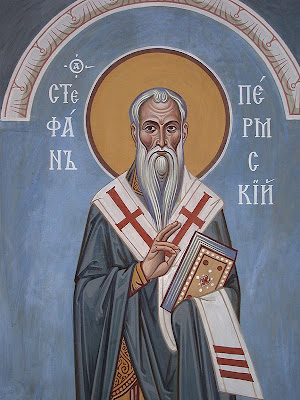 (Russian : Стефан Пермский / Stefan Perms, also spelled "Stephan") (1340 – 1396)was a fourteenth century missionary credited with the conversion of the Komi Permyaks to Christianity and the establishment of the Bishopric of Perm'. Stephen also created the Old Permic script, which makes him the founding-father of Permian written tradition.
(Russian : Стефан Пермский / Stefan Perms, also spelled "Stephan") (1340 – 1396)was a fourteenth century missionary credited with the conversion of the Komi Permyaks to Christianity and the establishment of the Bishopric of Perm'. Stephen also created the Old Permic script, which makes him the founding-father of Permian written tradition.Saint Stephen, was born around the year 1340 into the family of Simeon, a cleric of the Ustiug cathedral. He was greatly influenced by his pious mother Maria. Endowed with great abilities, he already displayed an unusual zeal for the service of the Church: in a single year he learned to read the Holy Books and he assisted his father in church during services, fulfilling the duty of canonarch, and also that of reader.
Stephen took his monastic vows in Rostov, where he learned Greek and learned his trade as a copyist. In the year 1376, he voyaged to lands along the Vychegda and Vym' rivers, and it was then that he engaged in the conversion of the Zyriane (Komi peoples). Rather than imposing the Latin or Church Slavonic on the indigenous pagan populace, as all the contemporary missionaries did, Stephen learned their language and traditions and worked out a distinct writing system for their use. Although his destruction of pagan idols (e.g., holy birches) earned him the wrath of some Permians, Pimen, the Metropolitan of All Rus', created him as the first bishop of Perm'.
In the year 1395 St Stephen again went to Moscow on affairs of his flock, and died there. His body was placed in the Church of the Transfiguration in the Moscow Kremlin. The Zyrians bitterly lamented the death of their archpastor. They earnestly entreated the Moscow prince and the Metropolitan to send the body of their patron back to Perm, but Moscow did not wish to part with the relics of the saint.
The historian Serge Zenkovsky wrote that St. Stephen of Perm, along with Epiphanius the Wise, St. Sergius of Radonezh, and the great painter Andrei Rublev signified "the Russian spiritual and cultural revival of the late fourteenth and early fifteenth century." Indeed, Stephen's life encapsulates both the political and religious expansion of "Muscovite" Russia. Stephen's life was in fact commemorated in the writings of the aforementioned Epiphanius, who famously wrote the Panegyric to Saint Stephen of Perm, a text with praises Stephen for his evangelical activities, and styles him the "creator of Permian letters"
Stephen of Perm - 26 April - Missionary, Bishop and Teacher
The Collect.
ALMIGHTY and everlasting God, we thank thee for thy servant Stephen of Perm, whom thou didst call to preach the Gospel to the Zyrians: Raise up, we pray thee, in this and every land, heralds and evangelists of thy kingdom, that thy Church may make known the unsearchable riches of Christ, and may increase with the increase of God; through the same thy Son Jesus Christ our Lord. Amen.
The Epistle - Acts 1:1-9.
THE former treatise have I made, O Theophilus, of all that Jesus began both to do and teach, until the day in which he was taken up, after that he through the Holy Ghost had given commandments unto the apostles whom he had chosen: to whom also he shewed himself alive after his passion by many infallible proofs, being seen of them forty days, and speaking of the things pertaining to the kingdom of God: and, being assembled together with them, commanded them that they should not depart from Jerusalem, but wait for the promise of the Father, which, saith he, ye have heard of me. For John truly baptized with water; but ye shall be baptized with the Holy Ghost not many days hence. When they therefore were come together, they asked of him, saying, Lord, wilt thou at this time restore again the kingdom to Israel? And he said unto them, It is not for you to know the times or the seasons, which the Father hath put in his own power. But ye shall receive power, after that the Holy Ghost is come upon you: and ye shall be witnesses unto me both in Jerusalem, and in all Judea, and in Samaria, and unto the uttermost part of the earth. And when he had spoken these things. while they beheld, he was taken up; and a cloud received him out of their sight.
The Gospel - St. Luke 10:1-9.
AFTER these things the Lord appointed other seventy also, and sent them two and two before his face into every city and place, whither he himself would come. Therefore said he unto them, The harvest truly is great, but the labourers are few: pray ye therefore the Lord of the harvest, that he would send forth labourers into his harvest. Go your ways: behold, I send you forth as lambs among wolves. Carry neither purse, nor pack, nor shoes: and salute no man by the way. And into whatsoever house ye enter, first say, Peace be to this house. And if the son of peace be there, your peace shall rest upon it: if not, it shall turn to you again. And in the same house remain, eating and drinking such things as they give: for the labourer is worthy of his hire. Go not from house to house. And into whatsoever city ye enter, and they receive you, eat such things as are set before you: and heal the sick that are therein, and say unto them, The kingdom of God is come nigh unto you.
Reference and Resources:
http://en.wikipedia.org/wiki/Stephen_of_Perm
http://ocafs.oca.org/FeastSaintsViewer.asp?FSID=101208
http://www.commonprayer.org/calend/propers/com_miss.cfm
†
No comments:
Post a Comment